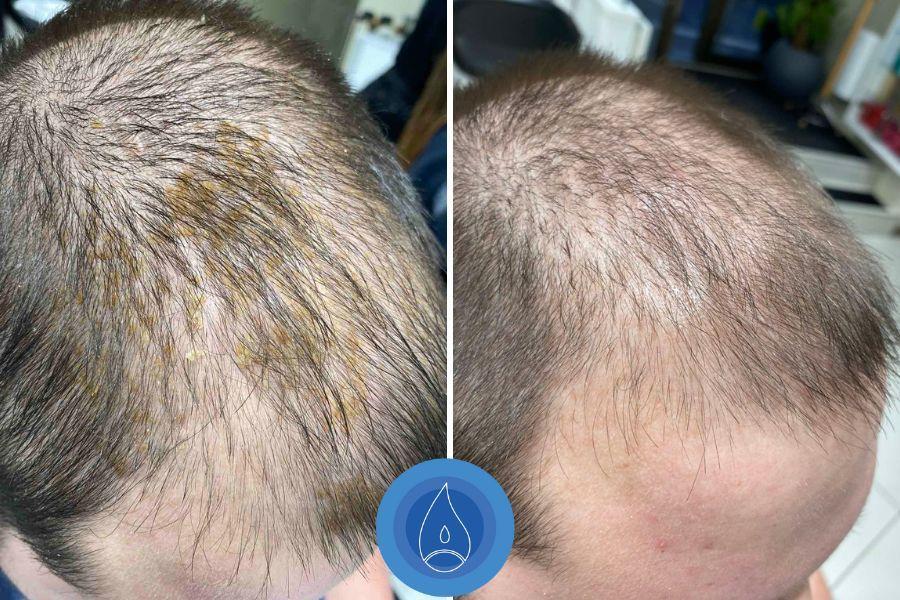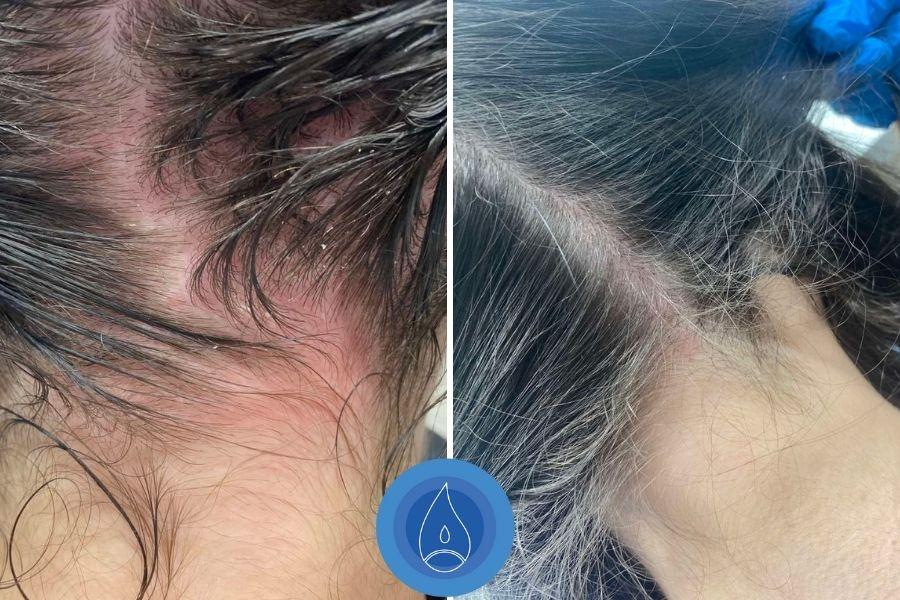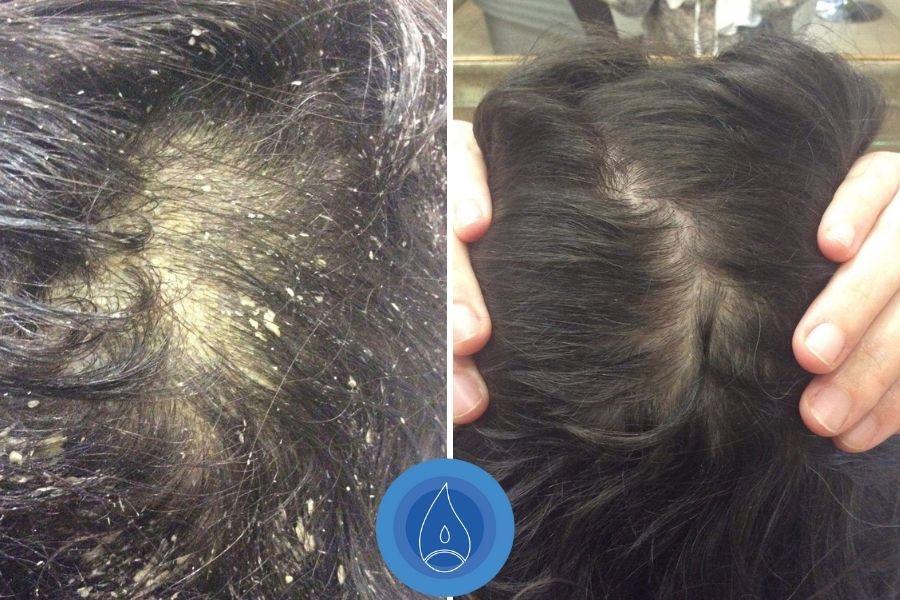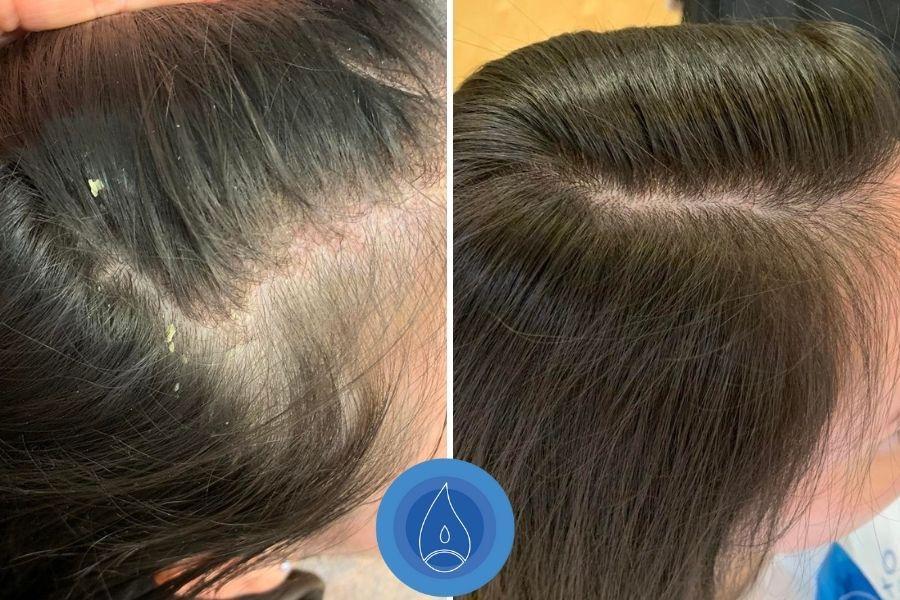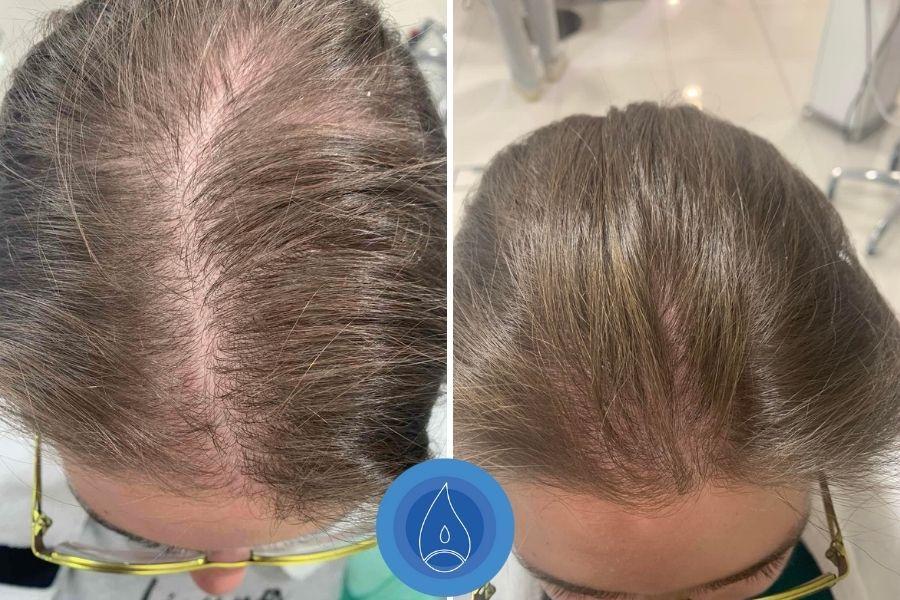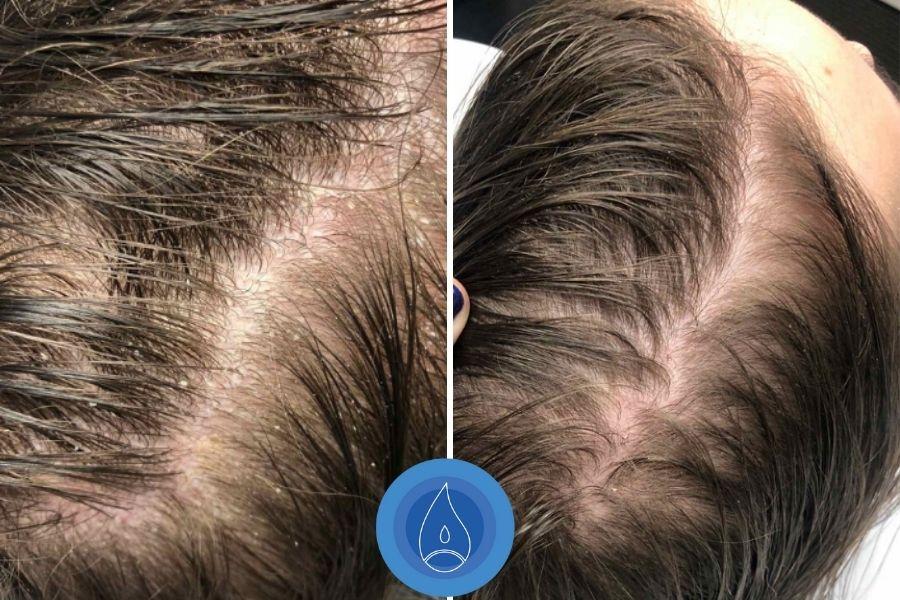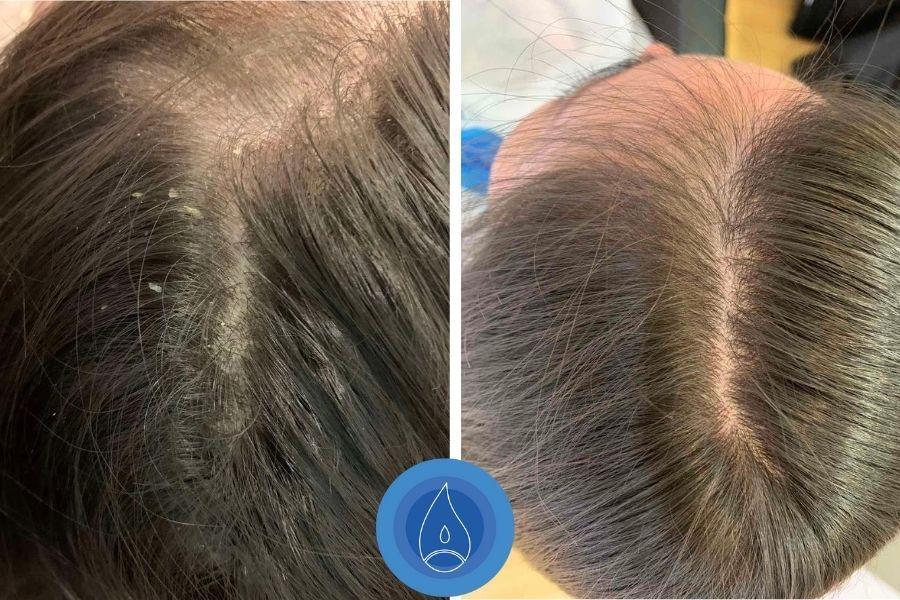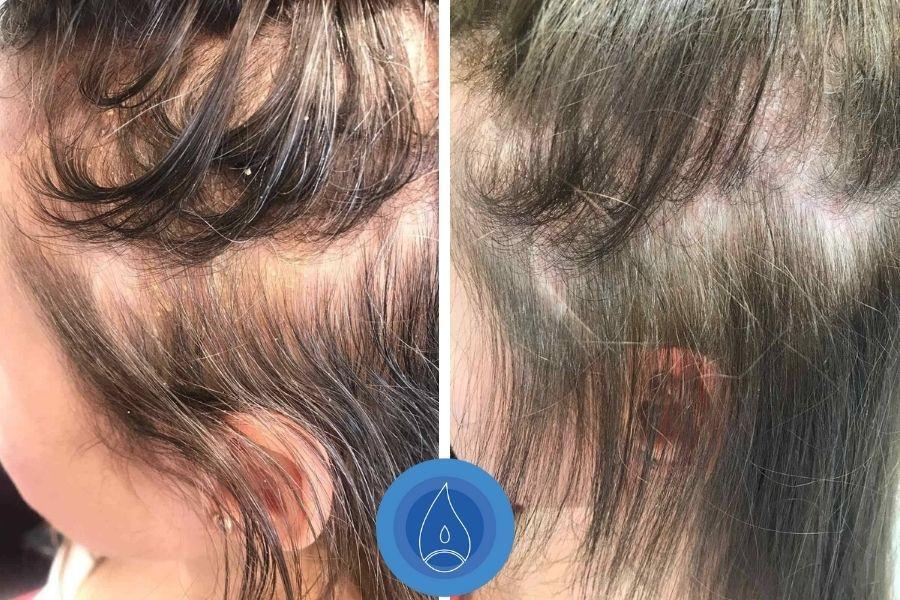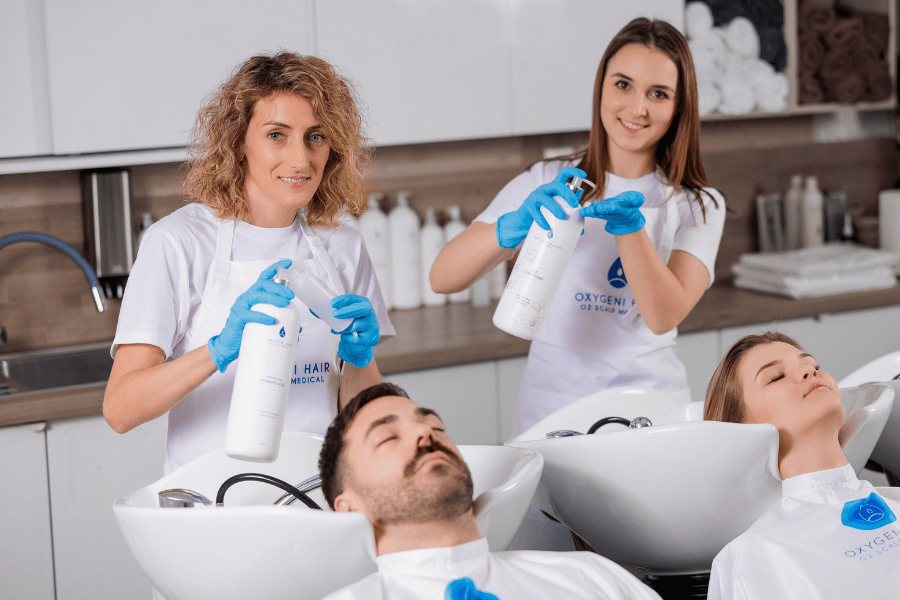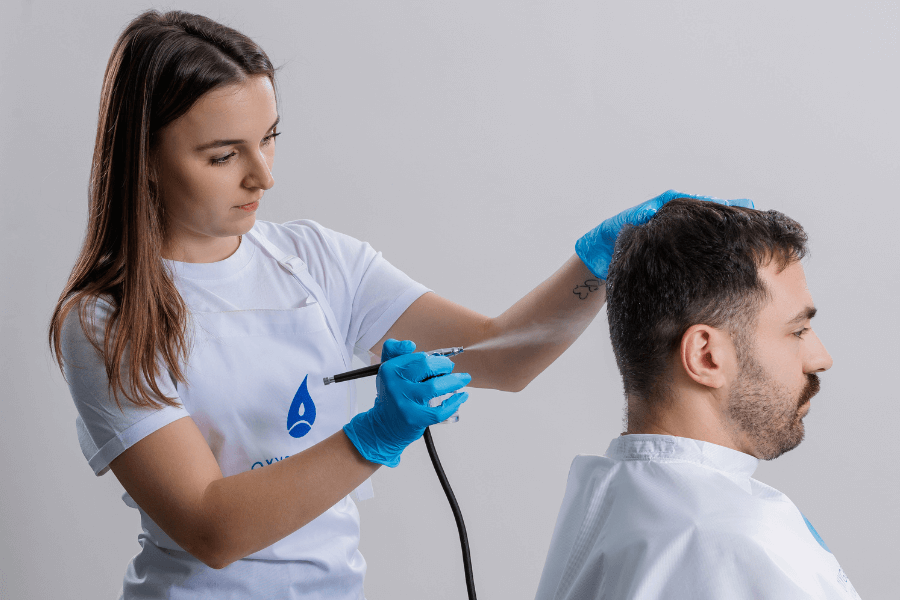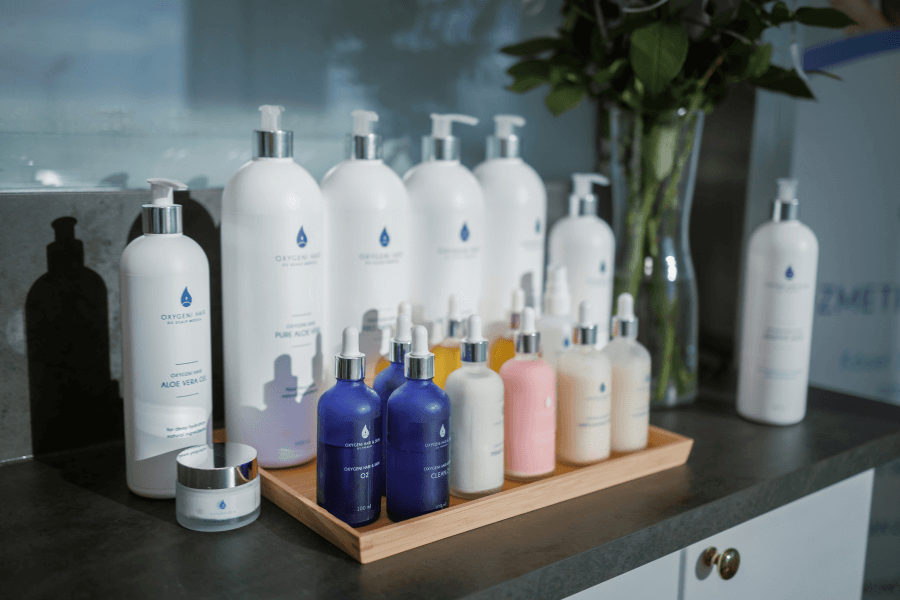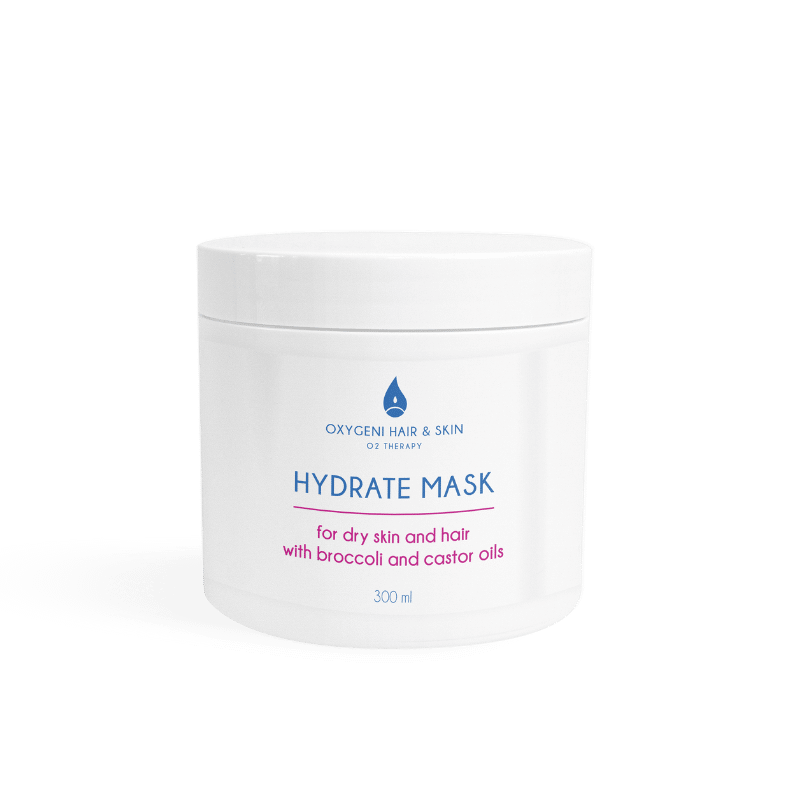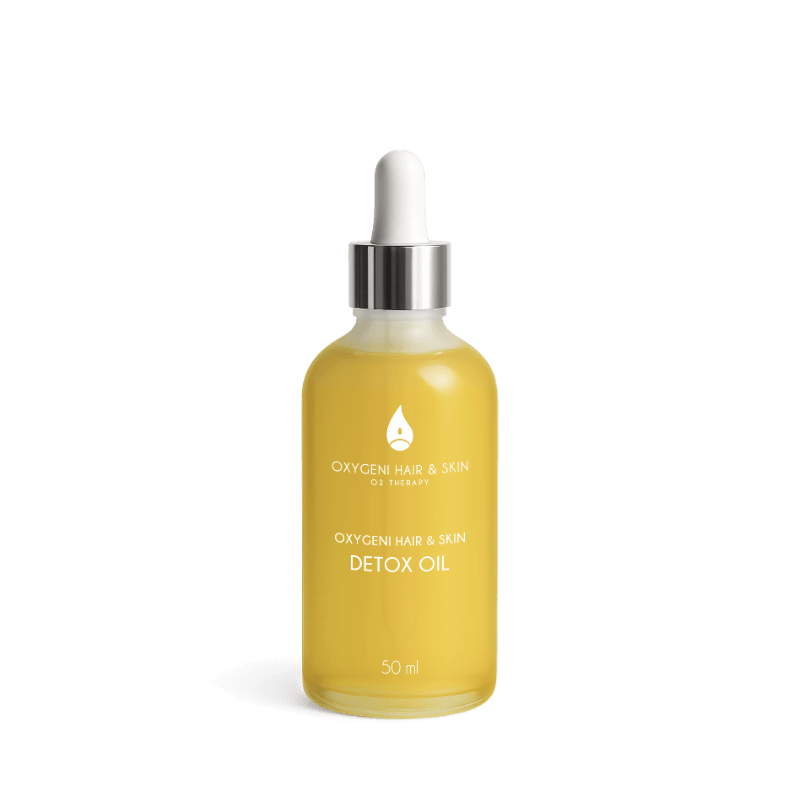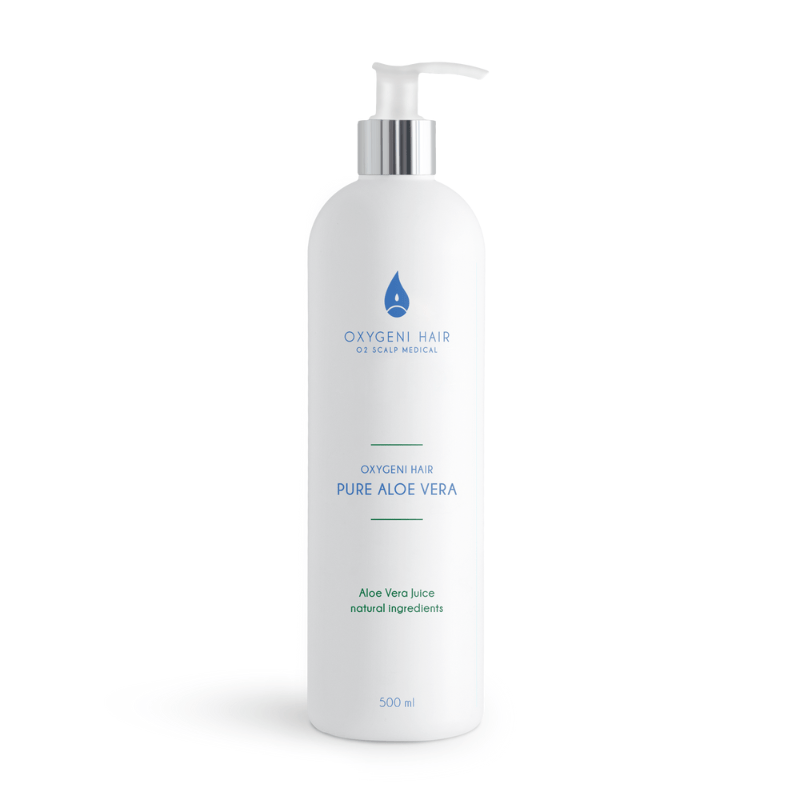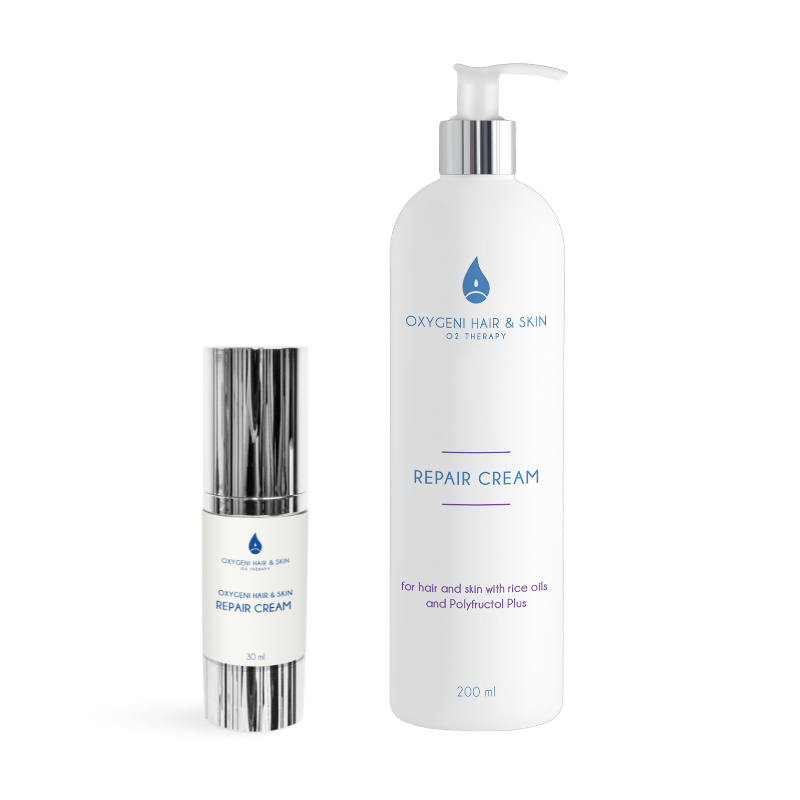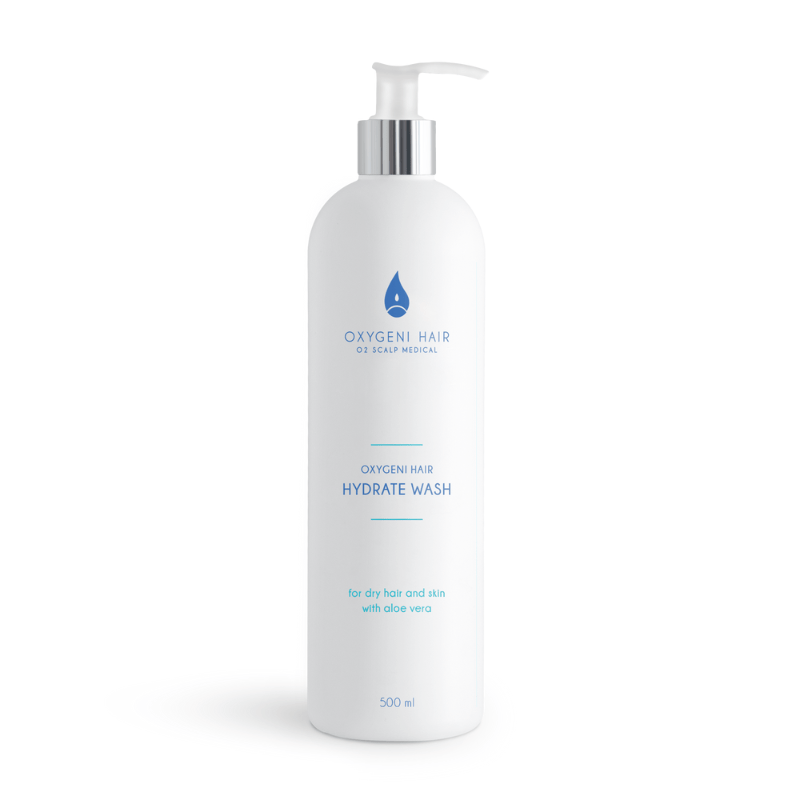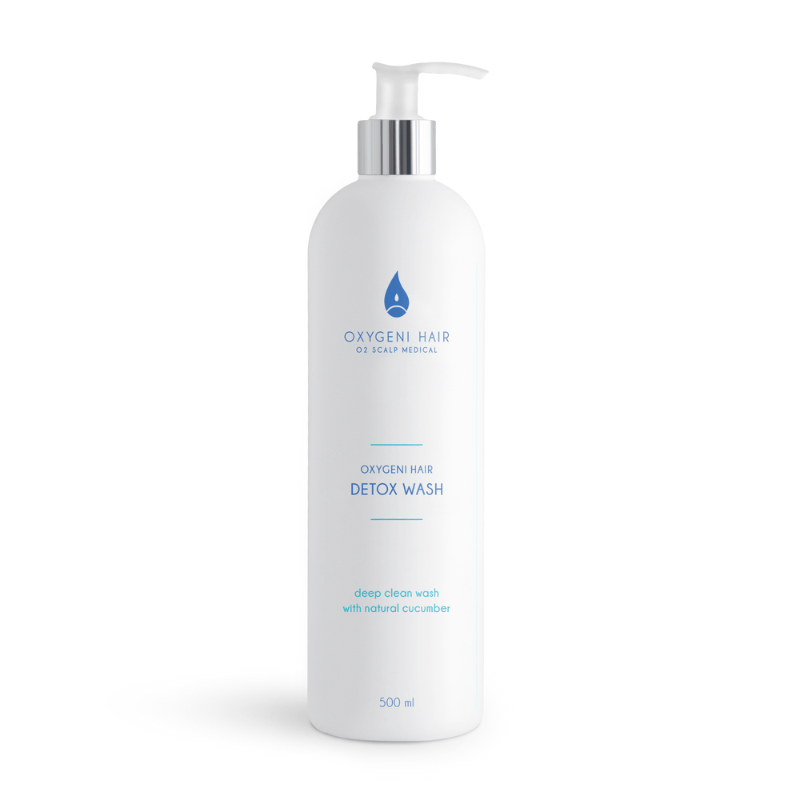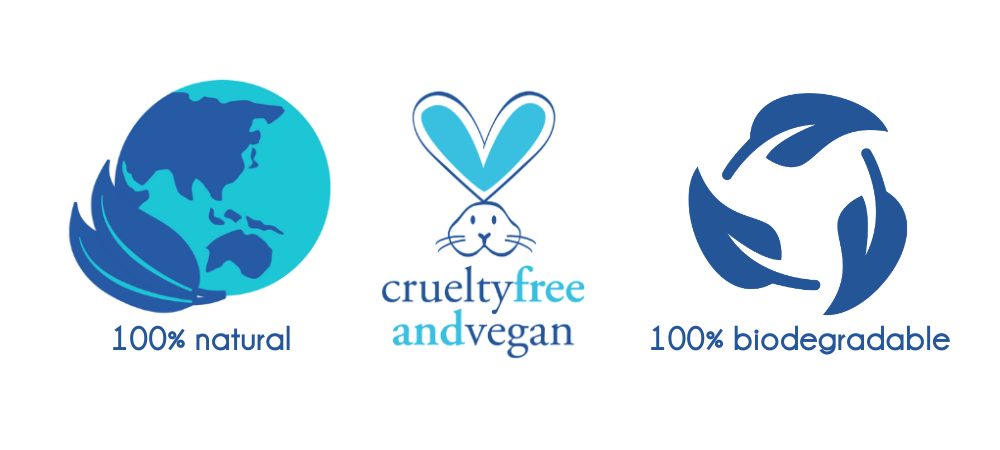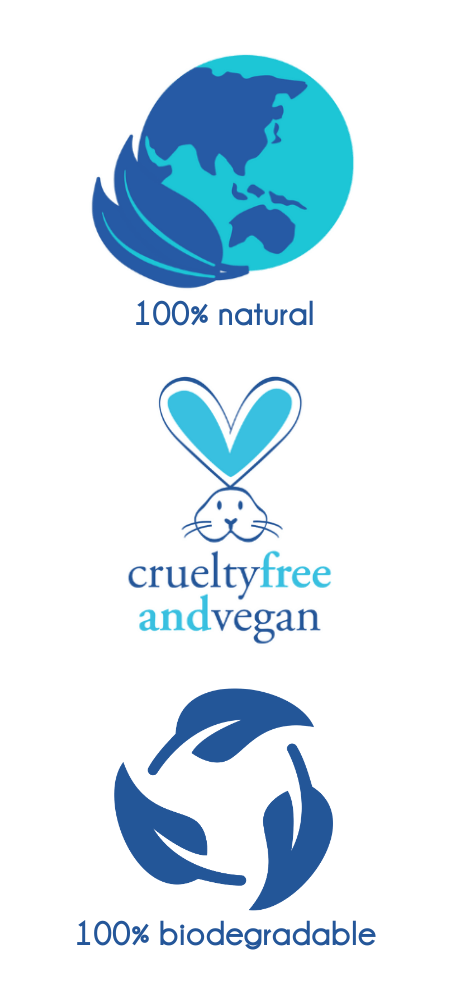Seborrhea
Seborrhea
How to recognize seborrhea, and what are the treatment options?
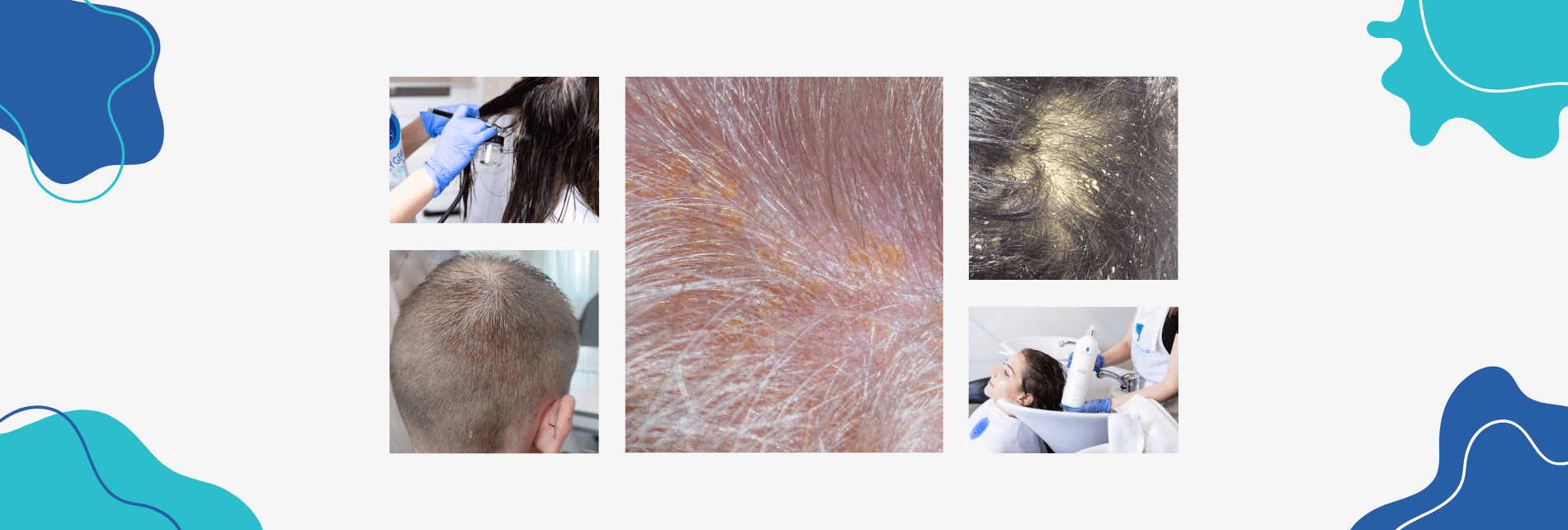
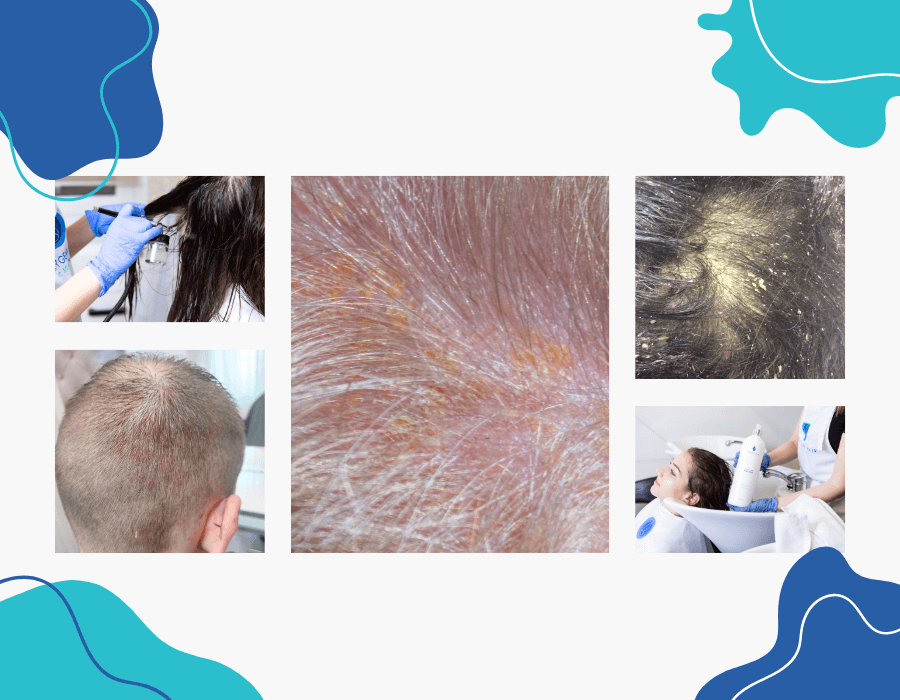
WHAT IS SEBORRHEA?
Seborrhea, also known as seborrheic dermatitis, is a lifelong autoimmune condition that may have symptom-free periods, but the symptoms tend to recur over time. It primarily affects the scalp but can also appear on the face, chest, back, and other oily areas of the body. Dandruff is caused by an overgrowth of fungi, while oily skin is due to excessive sebum production on the scalp and skin. There are several potential causes for the development of seborrhea, often a combination of factors leads to the problem.
Seborrhea affects about 5% of the population and can develop in any age group, in both women and men. Childhood seborrhea is often temporary, and symptoms usually appear on the scalp, around the ears, or near the eyebrows.
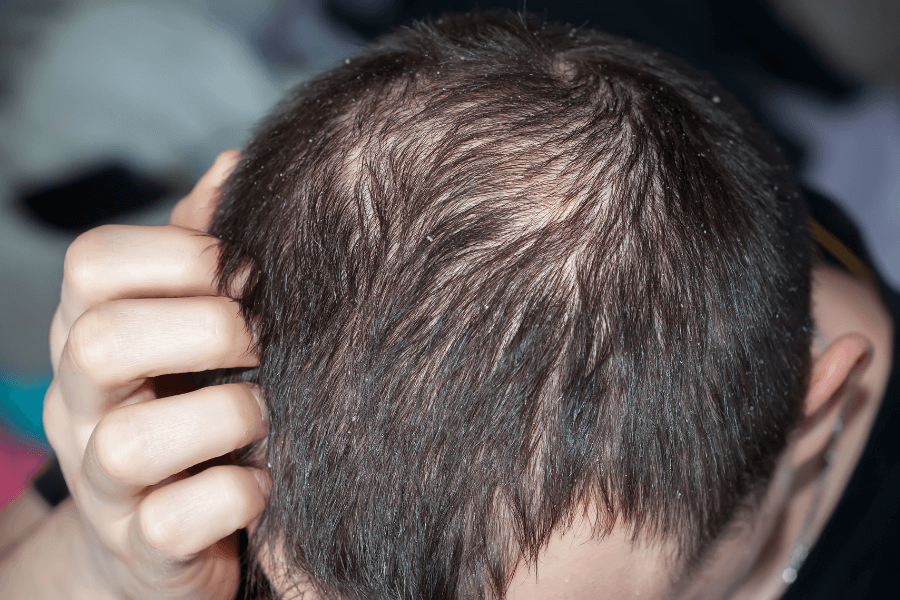
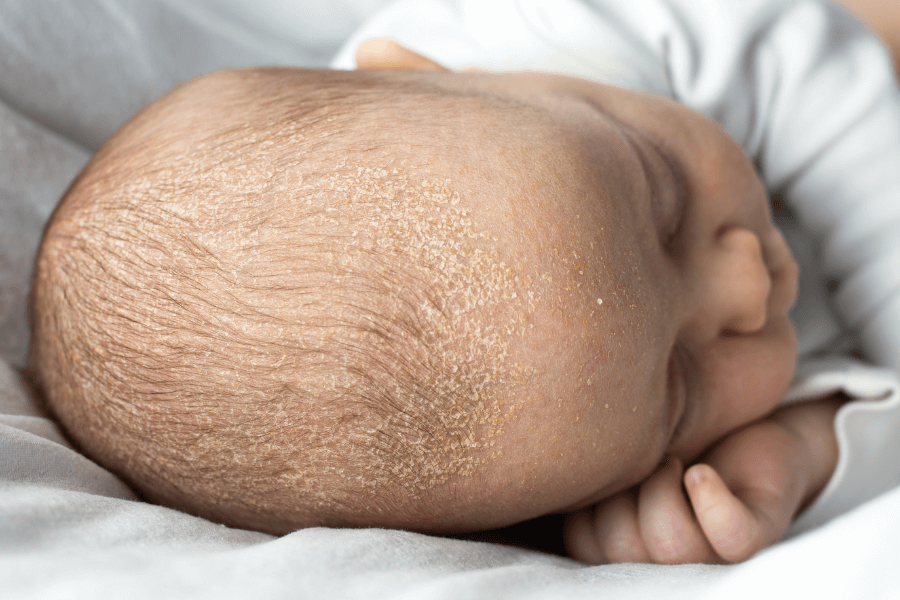
What Does An Autoimmune Background Mean in the Case of Seborrhea? How Does seborrhea Relate to Intolerances?
Autoimmune processes arise due to intolerances in the body.
Various intolerances can be involved, such as air pollution, chemicals, pesticides, radiation, unsuitable hair and skin care routines, medications, illnesses, medical treatments (e.g., chemotherapy, hormone therapy), vitamin deficiencies, and other deficiencies like malnutrition or gut issues.

Seborrhea can also be triggered by food intolerances, which have become quite common due to the widespread use of artificial substances in food production, such as fertilizers, preservatives, contaminated water, and additives. Emotional factors, such as stress, family issues, or divorce, as well as poor lifestyle choices, can also lead to these intolerances. When multiple intolerances affect the body, the immune system may start attacking its own cells, leading to the development of autoimmune diseases.
Did you know that seborrhea can have multiple causes?
- Intolerances
- Genetic predisposition
- Malassezia fungus
- Excess sebum production, hormonal changes
- Weather changes
- Stress and exhaustion
- Weakened immune system
- Lifestyle habits
What Are the Symptoms of Seborrhea?
Symptoms of seborrhea include dandruff, itching, redness, and inflamed skin or scalp. Temporary hair loss may also occur due to excessive scratching or the inflammatory process. Seborrhea is often accompanied by oily skin and scalp, although dry seborrhea can also occur. It is important to distinguish seborrhea from dandruff, as dandruff is treatable and only temporary, while seborrhea is a lifelong autoimmune condition.
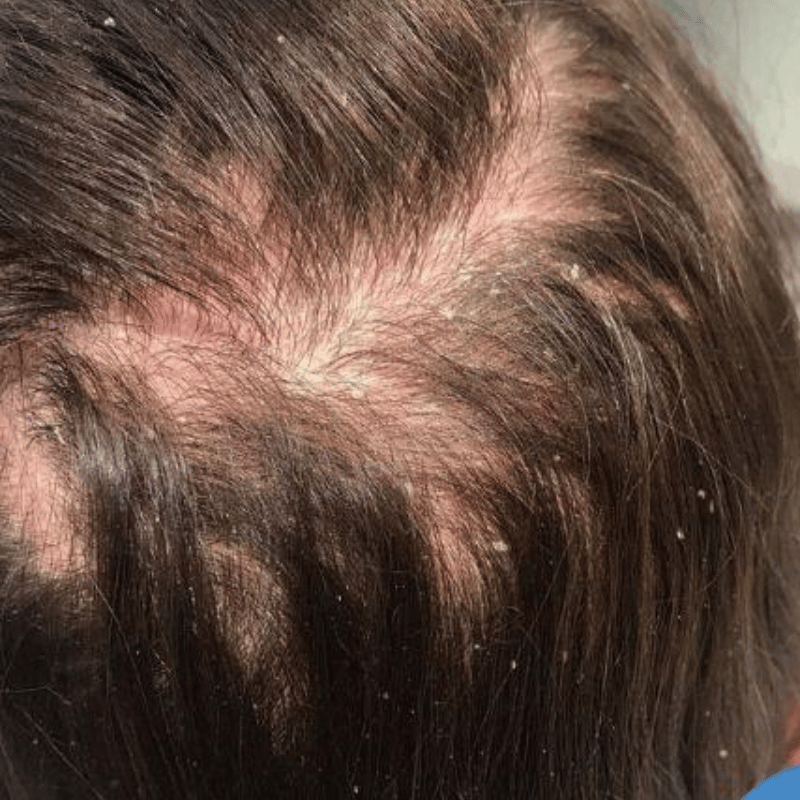
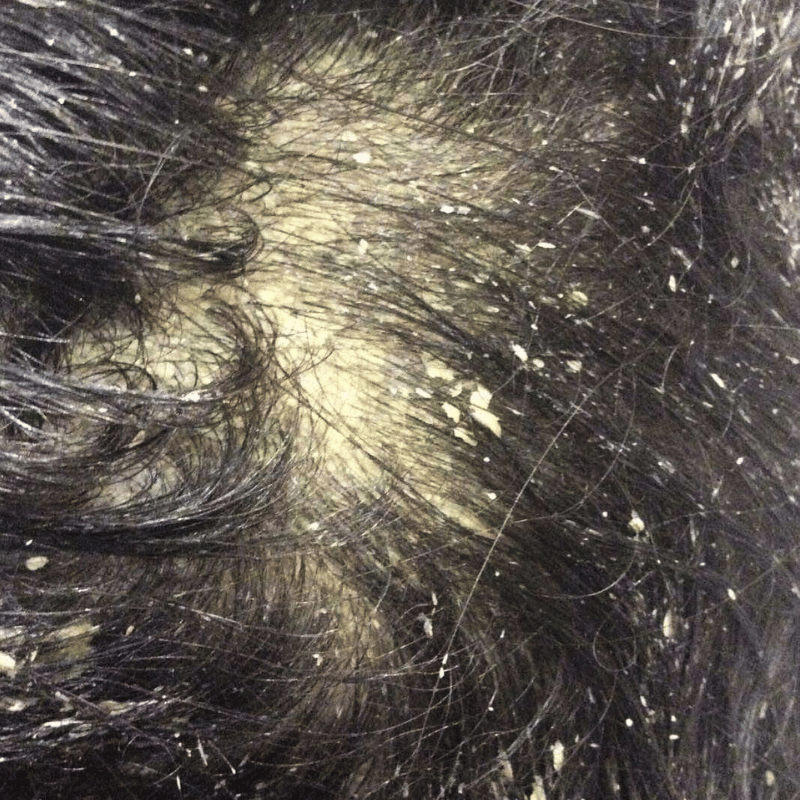
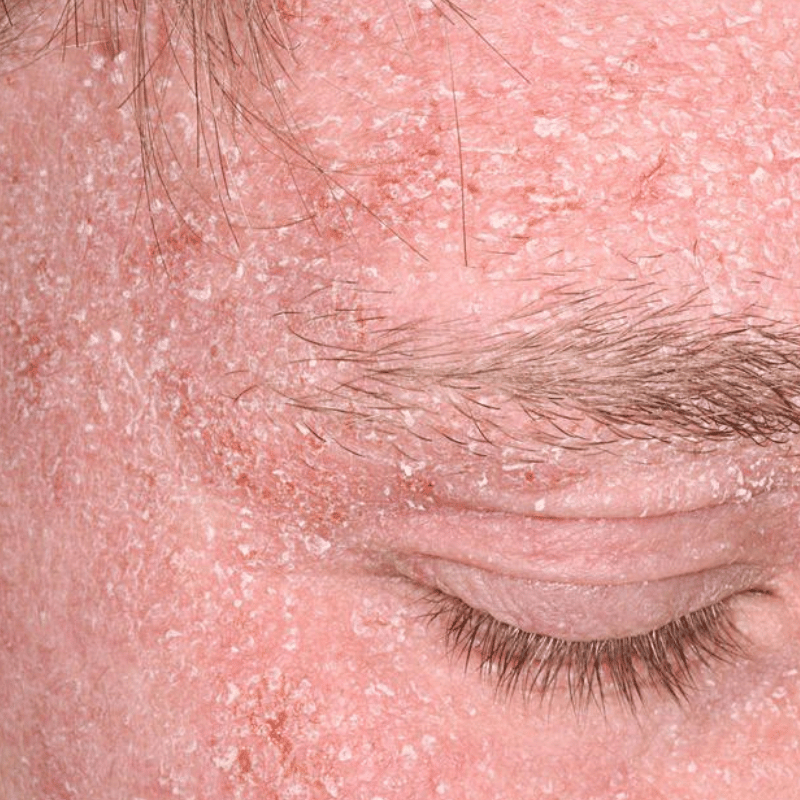
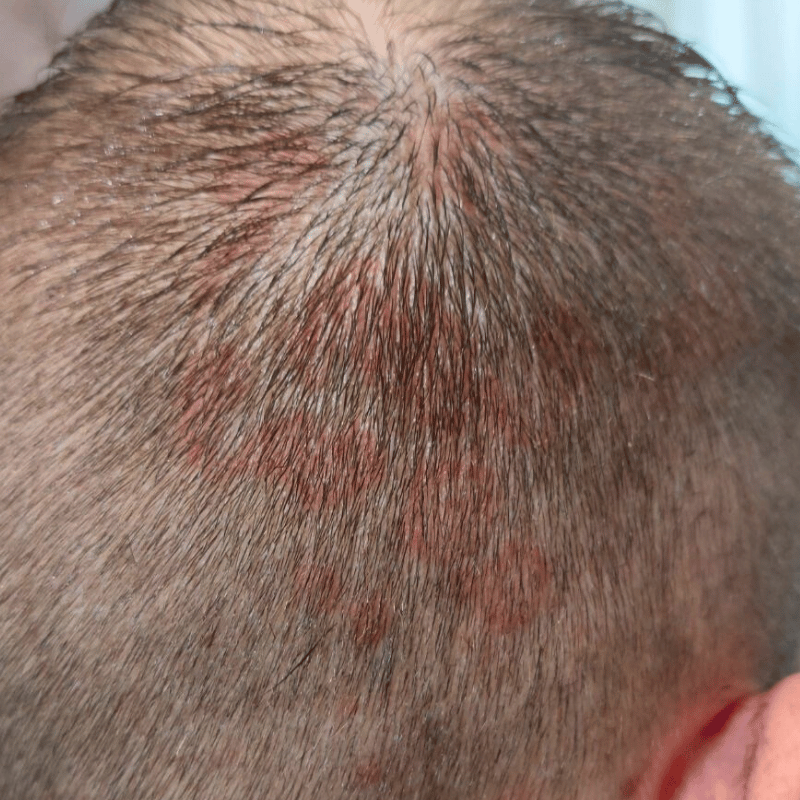
Sebum production issues
Excessive sebum production can cause an overproduction of oil that sticks to the dead cells on the scalp, preventing them from shedding naturally. Instead, these dead cells remain on the scalp, leading to infections and inflammation. The sebum layer can block the openings of the sebaceous glands, causing the hair follicles to become unhealthy and fragile prematurely, which can result in hair loss. The underlying causes of oiliness may include intestinal diseases, hormonal imbalances, poor diet, stress, physical strain, consumption of fatty and carbohydrate-rich foods, or the overuse of synthetic dietary supplements.
Bacterial Superinfection
Seborrhea is often accompanied by oily skin and scalp. The sebum layer easily attracts dust and dirt, creating an environment where bacteria can multiply, potentially leading to bacterial superinfections. In such cases, a noticeable “scalp odor” may persist even after washing with shampoo. In these situations, it’s important to disinfect the scalp and use antibacterial products. However, it’s important not to over-dry the scalp and skin, and to hydrate them with products that do not contain harsh chemicals.
Seborrhea Symptoms Can Be Alleviated! Check out the results achieved with oxygen therapy:
- Bloating, digestive problems – constipation or diarrhea
- Dry and irritated skin all over the body
- Hormonal issues, heavy menstruation
- Hair loss, scalp itching
- Oily or overly dry scalp, sebaceous gland dysfunction
- Lymphatic system congestion
- Headaches, fatigue, irritability
Apart from skin symptoms, what other issues could you encounter?
Severity Levels
The severity of seborrhea can range from mild to severe. The typical severity levels are as follows: Mild seborrhea (slight flaking or dandruff, mild itching, occasional redness), Moderate seborrhea (more persistent dandruff, noticeable redness, moderate itching, and oily patches), Severe seborrhea (intense itching, significant redness, thick, greasy scales, and possible secondary infections from scratching)
Treatment options vary depending on the severity of the problem. Mild cases can often be treated at home, while moderate and severe cases require long-term professional care and the introduction of a strict scalp and hair-care routine. It is also important to identify the possible causes and avoid factors that trigger or worsen the problem, such as stress, certain weather conditions, or harsh cosmetic products.
How can to distinguish Seborrhea from other problems?
Dandruff or Seborrhea?
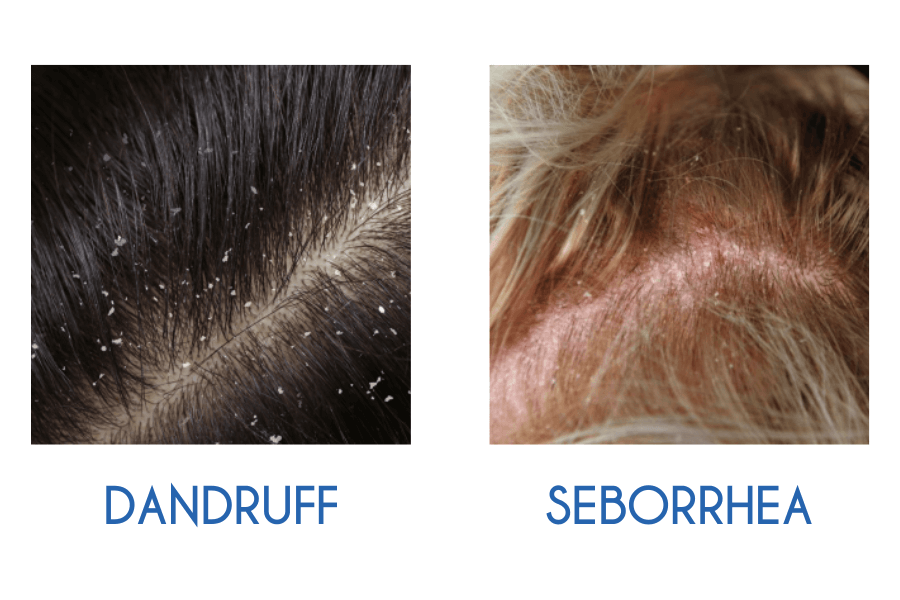
Psoriasis or Seborrhea?
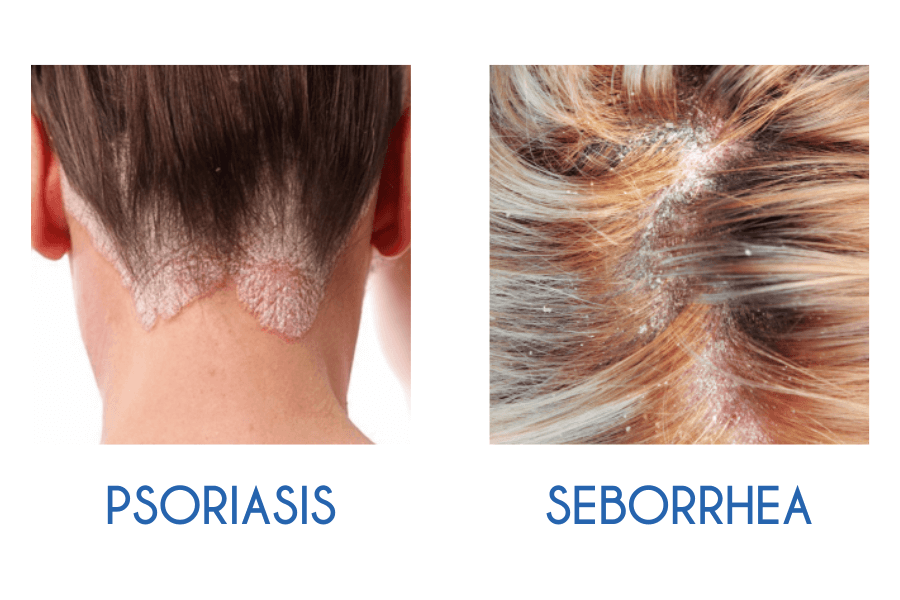
What Can Trigger Seborrhea?
While there is no definitive list of foods that trigger seborrhea for everyone, certain components can exacerbate the condition in some individuals. In addition to avoiding potential dietary triggers, some foods and nutrients with anti-inflammatory properties can help manage seborrhea. Foods rich in omega-3 fatty acids and antioxidants are beneficial. Additionally, foods high in probiotics, such as yogurt, kefir, sauerkraut, and other fermented foods, can help maintain a healthy balance of microorganisms in the gut.
Foods that can trigger seborrhea include:
Excessive sugar intake can increase inflammation and lead to flare-ups.
Foods such as white bread, pasta, and pastries can have an inflammatory effect similar to high-sugar foods.
Milk, cheese, and other dairy products can worsen symptoms by increasing inflammation and itching.
Alcohol consumption can trigger or exacerbate seborrhea in some individuals due to its inflammatory effects and potential negative impact on the immune system.
Foods high in unhealthy fats can contribute to increased oil production and inflammation.
These often contain additives, preservatives, and unhealthy fats, which can aggravate the condition.
The Connection Between Seborrhea and Hormonal Balance
Hormonal Fluctuations
Hormonal fluctuations (puberty, menstrual cycle, pregnancy, PCOS) can affect androgen levels or cause variations in sebum production, leading to seborrhea flare-ups.
Stress
Stress should not be overlooked, as it can lead to increased cortisol production, a hormone that can exacerbate inflammation and oiliness, potentially worsening seborrheic dermatitis.
Adrenal Gland Conditions
Conditions affecting the adrenal glands, such as adrenal hyperfunction, can alter androgen levels and impact sebaceous gland inflammation. Thyroid dysfunction, both hyperthyroidism and hypothyroidism, can also affect skin health. Although these conditions do not directly cause seborrhea, they can contribute to skin changes that worsen the condition.
Androgens
Hormonal conditions and changes can significantly influence the development and worsening of seborrhea. Androgens, including testosterone, increase sebum production. Higher androgen levels can lead to oily skin, which is more prone to seborrheic dermatitis.
Managing and Reducing Stress
How to manage stress and related discomforts or illnesses? The first step is to identify the source of constant stress, though this is often difficult. Therefore, improving your quality of life and habits can help alleviate daily pressures, stress, and anxiety.

Exercise
Endorphins released during exercise can help reduce stress and anxiety. Stress often accompanies muscle tension, and exercise can help relax muscles and reduce accumulated tension. Regular exercise can also improve sleep quality, circulation, digestion, lower cholesterol, and blood pressure, with several psychological benefits.

Creative Hobbies
Creative hobbies can be excellent for stress reduction, as they distract from daily worries, stimulate creativity, and allow for immersion. Create your own decorations, gifts, or try various DIY projects! Listen to calming music, play an instrument, or sing. Singing and instrumental music can also be great stress relievers. Going outdoors or exploring the city and taking photos can be a creative escape.

Wellness
Visit a wellness facility where you can enjoy massages, hot baths, saunas, and other relaxation therapies. These experiences can help you unwind, relieve tension, and reduce stress.

Breathing Exercises
Your breathing directly reflects the level of tension in your body, being conscious about proper breathing can be very beneficial. Steady breathing can automatically lower stress hormone levels, reduce heart rate, and lower blood pressure. In a relaxed, calm state, breathing becomes deeper and more complete, with a focus on the abdominal area.
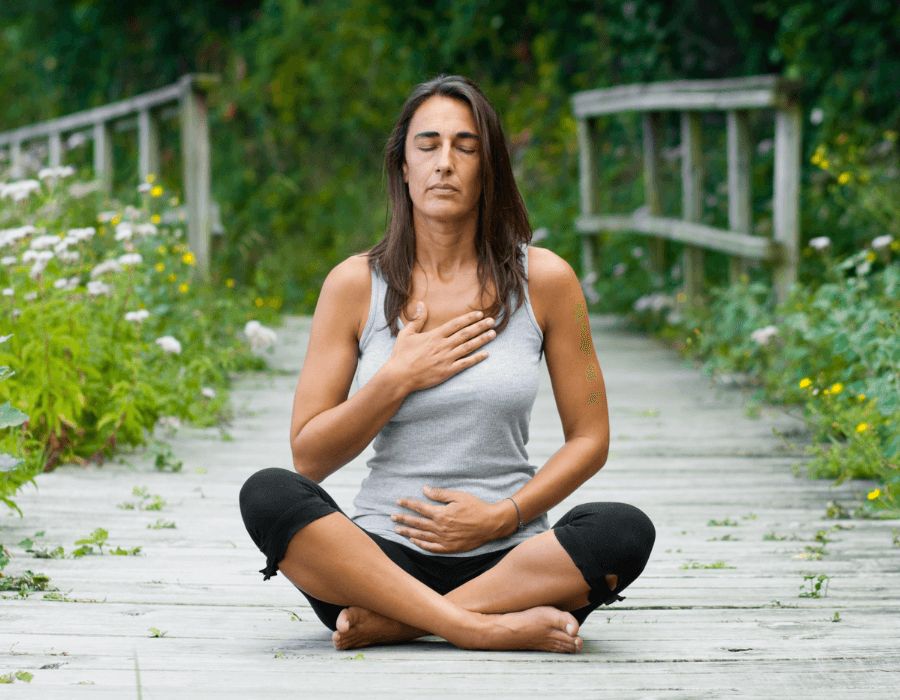
Meditation
We are rarely able to be fully present in the moment, especially in Western societies that struggle to grasp the concept of doing nothing or “just existing.” Meditation leads us to this state, allowing us to completely stop, release thoughts, and focus solely on the present moment.

Yoga
Yoga promotes the unity of mind, body, and spirit. While Western societies often view yoga as stretching, it encompasses a broader life philosophy and a developed system of personal transformation. This system includes a vegetarian diet, ethical code, concentration and relaxation practices, breath control exercises, and meditation.
Recommended Laboratory or Medical Tests for Seborrhea
Food intolerance test
Allergy test
Celiac disease screening
Comprehensive lab tests + hormone panel
Insulin intolerance
Histamine sensitivity
Prescription medications from dermatologists often cannot be used long-term due to side effects, and they often only provide temporary relief. What can we do in this case?
Seborrhea Treatment
1.
External Anti-Inflammatory Treatments
There are various methods to treat seborrhea. Often, products and medications containing artificial substances are used, which can cause additional issues. Aggressive shampoos, creams, and medications might offer a short-term solution, typically lasting up to 3 months. However, stopping the treatment often worsens the skin condition. Continued use of these products can lead to permanent health damage, including inflammation of the skin and hair follicles, as well as hair loss.
For lasting recovery, using chemical-free and 100% natural products helps provide a long-term solution. Natural products help relieve symptoms and prevent flare-ups of seborrhea.
2.
Avoid Aggressive Medications and Treatments, Opt for 100% Natural Alternatives
Nowadays, many treatments disguised as “medical” options offer quick and effective solutions, but these usually help only for a few weeks to months before the problem worsens. Most treatments involving injections or needles aim to deliver the active ingredients as deeply as possible. The danger lies in the fact that these substances are often not chemical-free, and may include aggressive medications or create dependency for the skin.
There are many natural alternatives on the market that can replace some medications, such as herbal teas, tinctures, adaptogenic herbal supplements, and superfoods. The main, lasting solution to help reduce medication intake is lifestyle change.
The exacerbation of seborrhea is often triggered by harsh skincare products. For sustained healing, using chemical-free and 100% natural products helps offer a long-term solution.
3.
Restoring Digestive Health and Absorption Issues
The intestines influence many things! In cases of deficiency detected through lab or other tests, it is often due to inadequate “deficient” nutrition, or more commonly, absorption issues and improper functioning of the digestive system.
Taking large amounts of vitamins daily might not be the best solution, as an inflamed digestive system may not effectively utilize them. The first and most important step is to address gut health and establish a diet rich in antioxidants and fiber. Avoid all pre-packaged “factory” foods and highly processed, non-fresh foods!
Some foods can irritate the digestive system and cause inflammation in the body. Gluten, lactose, milk protein, egg white, and yeast are the most common problem-causing food proteins. Unfortunately, over time, more proteins can cause inflammation if the underlying condition is not treated in time.
4.
The Importance of Nutrition
Nutrition plays a crucial role in the development and severity of conditions like seborrhea. It is important to note that seborrhea is often associated with food intolerances—commonly sensitivities to gluten, dairy, eggs, and yeast. Investigating these intolerances is essential for managing symptoms.
For effective healing, minimize the intake of fatty, heavy foods, dairy products, and sugar. Try to eliminate sugar as much as possible, as seborrhea bacteria and fungi feed on it. Due to the presence of fungi and bacteria, it is also advisable to undergo a candida test for more effective treatment. Opt for fiber-rich and whole-grain carbohydrates, and consume plenty of vegetables and fruits, preferably those with low sugar content. Also, ensure adequate hydration for both external and internal needs of the body.
Often, the issue is not what we eat, but what we don't eat!
Not consuming foods rich in antioxidants, vitamins, and minerals can eventually lead to deficiencies. These deficiencies can manifest as inflammations, which also apply to seborrhea.
In cases of deficiencies identified through laboratory or other tests, there is a high likelihood of an underlying absorption issue. For confirmed deficiencies, continuously supplement the missing nutrients and pay close attention to your digestive system. Deficiencies are generally due to inadequate or “deficient” nutrition, and more often, due to improper functioning of the digestive system.
It may not be the best solution to take large amounts of vitamins and minerals daily, as an inflamed digestive system may not absorb them properly. The first and most important step is to restore gut health and establish a diet rich in antioxidants and fiber.
Always consult your doctor before taking any supplements!

A few more tips for treating seborrhea:
Regulate your skin and scalp’s sebum production with a balanced diet and suitable hair and skincare products!
Detoxify from the outside and from within!
Stay hydrated! Drink enough fluids and keep your skin moisturized!
Manage stress and emotional triggers. Seek professional help if you experience symptoms related to poor mental/emotional health.
Exfoliate! Our products can help you with this.
Avoid irritants and allergens.
IF YOU’RE LOOKING FOR AN EFFECTIVE METHOD TO TREAT SEBORRHEA: OXYGEN THERAPY
Seborrhea Treatment with Oxygen Therapy
Oxygen therapy offers an effective solution for treating seborrhea, as the combination of oxygen and active ingredients enhances the oxygen supply to the skin and hair follicles, as well as the scalp’s immunity. Oxygen therapy stimulates blood circulation, helps eliminate toxins, and reduces inflammation, thereby alleviating the symptoms of seborrhea, such as dandruff and greasiness.
This treatment provides a natural, chemical-free alternative that is gentle on the skin, unlike many traditional products containing chemicals, ensuring a long-lasting and healthy solution for scalp issues.
Oxygen therapy can be applied as a personalized treatment for any skin and scalp problem, guaranteeing visible results. The treatment is 100% reliable and risk-free, based entirely on natural active ingredients.
If you’re struggling with seborrhea, visit our salons for expert help!
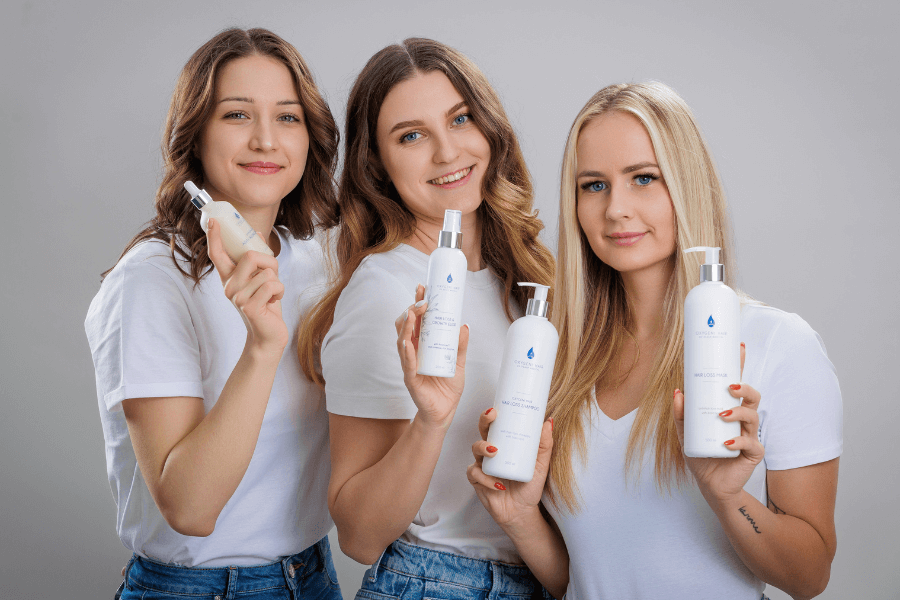

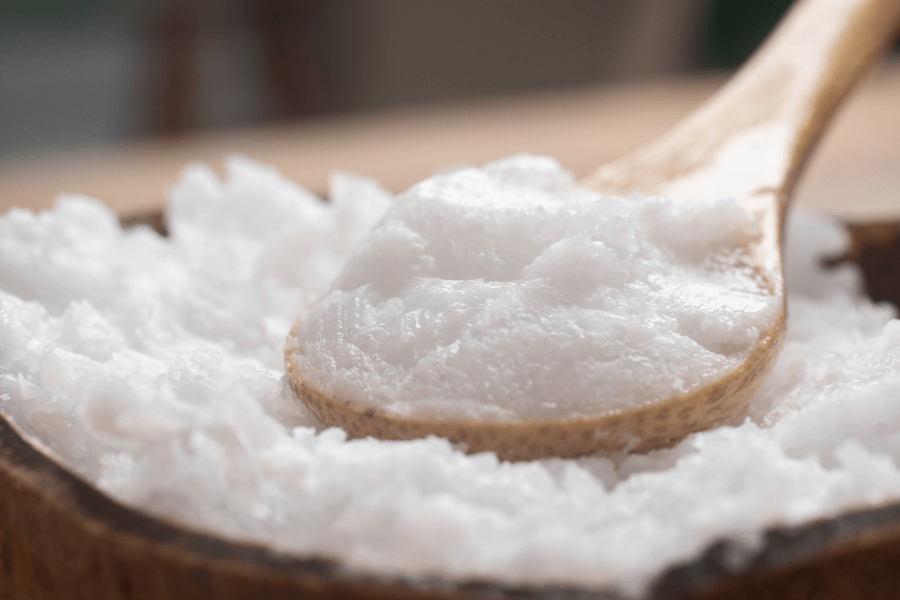
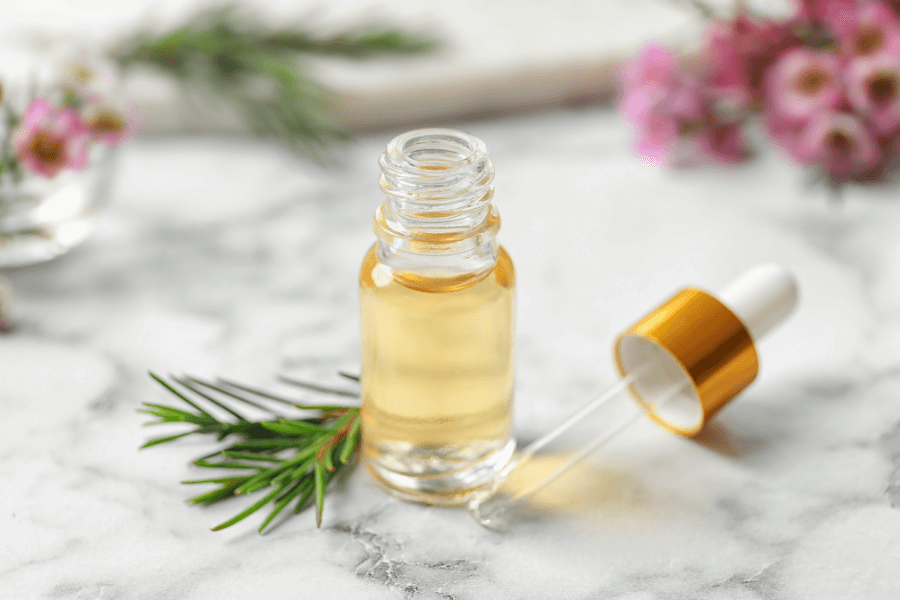
HOW TO TREAT SEBORRHEA SYMPTOMS AT HOME?
When treating seborrhea at home, regular and appropriate scalp and hair care is essential. First of all, it is advisable to choose gentle yet effective shampoos that help reduce excessive greasiness and dandruff. Additionally, it’s best to avoid washing your hair with hot water, as this can irritate the skin. The application of natural oils, such as tea tree oil or aloe vera, is also recommended, as these active ingredients soothe inflamed skin and help prevent infections. Reducing stress and maintaining a proper diet rich in vitamins and minerals can also contribute to alleviating the symptoms of seborrhea.
Natural ingredients for treating seborrhea :
Tea tree oil: Tea tree oil has strong antimicrobial properties, helping to eliminate one of the main causes of seborrhea, the Malassezia fungus. It is also effective against other fungi and bacteria that can cause infections.
Aloe vera: Aloe vera has natural anti-inflammatory properties. It helps reduce inflammation, redness, and irritation caused by seborrhea.
Coconut oil: Coconut oil is rich in fatty acids, vitamins (especially B vitamins), and antioxidants that promote skin health and regeneration. It deeply hydrates the skin, making it less prone to flaking and itching.
Jojoba oil: Jojoba oil has natural antibacterial and antifungal properties that help prevent infections. It does not clog pores, so it won’t exacerbate oily skin.
Lavender oil: Lavender oil, through its aromatherapy properties, reduces stress and anxiety, which can worsen seborrhea symptoms. Reducing stress can contribute to improving skin condition.
Try our skincare products containing 100% natural ingredients!
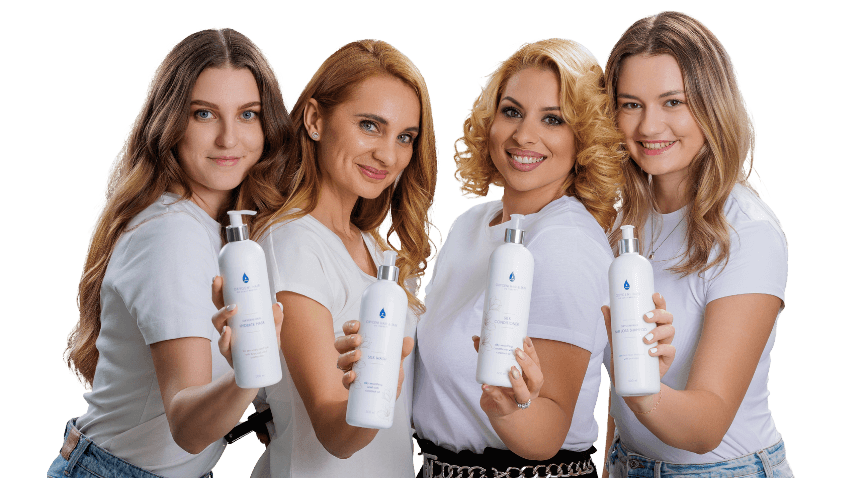
For long-term healing, using chemical-free and 100% natural products provides a lasting solution. The use of chemical-free products reduces intolerances; their 100% natural active ingredients do not irritate the skin and scalp, and they exert their beneficial properties naturally. The use of natural products can greatly assist not only in alleviating symptoms but also in prevention!
Our products and product bundles can be excellent solutions for skin and haircare routine. We will show you which products are worth incorporating into your hair and skincare routine if you are struggling with seborrheic skin disease.

Recommended products for treating seborrhea:
If you want to treat seborrheic skin and scalp as effectively as possible, we recommend the following product bundles. The products work together to help cleanse, hydrate, and reduce inflammation. Additionally, they are specifically suitable for reducing sebum production and irritation. Thanks to its 100% natural composition, it provides a long-term solution for treating seborrhea.
Detox Wash:
The main active ingredient in Detox Wash is cucumber extract, which regulates sebum production, making it excellent for oily scalp and skin, which is a problem in cases of oily seborrhea. It also has powerful moisturizing, cleansing, astringent, and anti-inflammatory properties, alleviating itching and redness caused by seborrhea. Trace elements containing Vitamin B5 penetrate the skin and combat oily dandruff caused by seborrhea.
Hydrate Mask:
Thanks to its ricinoleic acid content, the Hydrate Mask has antibacterial properties, making it effective for treating seborrheic, inflamed, and sore skin and scalp. It gently regenerates dry, dull, chemically treated hair and skin. It has intensely nourishing, anti-inflammatory, and moisture-regulating properties, thus combating skin inflammation caused by seborrhea.
Detox Oil:
The main active ingredients of Detox Oil , tea tree oil and rosemary oil, contribute to the detoxifying, anti-inflammatory, and antifungal processes of the scalp, which are especially important in the case of seborrhea. It is a vitamin- and trace-element-rich product with strong soothing properties, making it a perfect solution for superinfected, seborrheic skin and scalp. Additionally, it has sebum-regulating properties, thus combating oily seborrhea. The circulation-boosting Detox Oil regulates dandruff on the scalp and is an excellent solution for treating superinfected, inflamed, damaged epidermis or wounded scalp.
Pure Aloe Vera:
Pure Aloe Vera is produced by warm pressing of the plant. It acts as an effective carrier for oils. It absorbs quickly and deeply, leaving no sticky fresidue. Soothes and hydrates sensitive skin and reduces irritation. It alleviates the symptoms of seborrhea, inflammation, and redness. It is recommended for dandruff and oiliness, making it perfect for treating seborrhea. It is an intense moisturizer with healing, soothing, and regenerating properties, suitable for all skin types.
Usage:
- For hair and scalp:Dilute 10-50 ml of Detox Wash (depending on hair length) in the applicator and distribute evenly over the scalp. Do not pre-mix shampoos and washes in the applicator! Freshly-mixed products can only be used within 24 hours, as they do not contain preservatives.
Apply a walnut-sized amount of Hydrate Mask to the hair roots and distribute it all the way to the hair ends. Leave-on for 5-15 minutes, then rinse it out thoroughly from your hair and scalp!
In a spray bottle, mix 10 ml of Pure Aloe Vera and 3-5 drops of Detox Oil. Shake the mixture well and spray it onto your towel-dried hair roots after washing, massage it in, and then dry your hair! - For Skin: As a body wash or facial cleanser, simply apply Detox Wash to the skin and cleanse it, then rinse off.
Apply a suitable amount of Hydrate Mask to the problem area! Leave-on for 10-15 minutes, then rinse off any excess.
In a spray bottle, mix a suitable amount of Pure Aloe Vera and Detox Oil for the problem area. Shake the mixture well and spray it onto the treated area and allow it to absorb!
Hydrate Wash:
Hydrate Wash is a multifunctional product recommended for treating dry scalp and skin, perfect as a shampoo, body wash, and facial cleanser. Thanks to its valuable active ingredients, it has antibacterial and anti-inflammatory properties and makes the skin more resilient, making it an especially recommended for treating dry seborrhea. Additionally, pantothenic acid reduces tissue inflammation and strengthens collagen fibers. Trace elements containing Vitamin B5 help eliminate dandruff and the issues of dry scalp and skin, thus combating the unpleasant symptoms of dry seborrhea.
Hydrate Mask:
Thanks to its ricinoleic acid content, Hydrate Mask has antibacterial properties, making it effective for treating inflamed and sore skin and scalp, which are common symptoms of seborrhea. It gently regenerates dry, dull, chemically treated hair and skin. It has intensely nourishing, anti-inflammatory, and moisture-regulating properties, thus reducing dryness and irritation caused by seborrhea.
Repair Cream:
Repair Cream is a luxurious moisturizer that can be applied to all skin surfaces. Thanks to its content of rice, macadamia, grape, and flaxseed oil, it is a nourishing aid for seborrheic skin. It is a 100% chemical-free and natural ingredient-based moisturizing cream that contains allergen-free fragrance, making it excellent for treating seborrhea. It also contains shea butter, which is recommended for deep-nourishing dry, inflamed, and damaged skin.
Usage:
- For hair and scalp: Dilute 10-50 ml of Hydrate Wash (depending on hair length) in the applicator and distribute evenly over the scalp. Do not pre-mix shampoos and washes in the applicator! Freshly-mixed products can only be used within 24 hours, as they do not contain preservatives.
Apply a walnut-sized amount of Hydrate Mask to the hair roots and distribute it all the way to the hair ends. Leave-on for 5-15 minutes, then rinse it out thoroughly from your hair and scalp!
For treating dry hair ends, pump 2-3 pumps of Repair Cream into your hand, then apply it to the wet hair ends and start blow-drying. - For skin: As a body wash or facial cleanser, simply apply Hydrate Wash to the skin and cleanse it, then rinse off.
Apply a suitable amount of Hydrate Mask to the problem area. Leave-on for 10-15 minutes, then rinse off any residue.
Afterward, apply an adequate amount of Repair Cream to the problem area on your face or body and allow it to absorb fully—no need to rinse it off.

